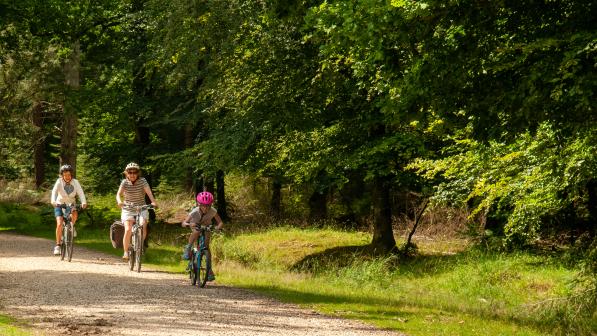20-year vision to push cycling and walking to the top of the travel hierarchy in Wales unveiled

The vision is set out in the draft transport strategy document ‘Llwybr Newydd: A New Wales Transport Strategy’, published on Tuesday November 17. Cycling UK welcomes the document and was pleased to have worked with the Welsh government in its development.
It sets out a range of policies to create an ‘accessible, sustainable transport system’ over the next 20 years which Lee Waters MS, Deputy Minister for Economy and Transport describes as "good for our communities, good for the environment and good for the economy".
Work on the report began before the outbreak of Coronavirus, but the final conclusions have been informed by the crisis, with the report acknowledging there was an opportunity to “consolidate what has been achieved through the change in people’s travel behaviour”.
The mini section of the report devoted to active travel states: “For people in Wales, we want walking and cycling to become the preferred way of getting around over shorter distances. By 2030 we want Wales to move from over-reliance on private car use, to an active travel nation, improving our health, environment and economy”.
We need to see...action on the ground which will make it possible to achieve that modal shift for short journeys from the car to walking and cycling
Gwenda Owen, Cycling UK engagement officer in Wales
It also highlights the need to adapt and respond to innovations, such as encouraging the uptake of active travel including e-bike and e-cargo bike schemes. The default speed limit in built-up areas is also proposed to be reduced from 30mph to 20mph to make walking and cycling feel safer.
Gwenda Owen, Cycling UK’s engagement officer for Wales said: “It is great to see that active travel is prioritized in this report and that walking and cycling are not an after-thought for transport policy this time, as has so often been the case before.
“The Welsh Government has been meeting with many stakeholders to ensure there were open and constructive discussions about what is needed. It is now all about delivery, we have much of the legislative framework in place but we need to see that translated into action on the ground which will make it possible to achieve that modal shift for short journeys from reliance on the car to walking and cycling.”
*Update 26 March 2021*
With thanks to several of our local volunteers in Wales for their input, our key points in response to the draft Wales Transport Strategy follows:
- We broadly welcome the draft Wales Transport Strategy's (WTS) long-term vision, its 20-year ambitions and its 5-year priorities. However, we are concerned by the lack of clarity on delivery and spending plans to achieve the admirable fine words. Without them, we cannot yet feel confident that they will be achieved in practice.
- We strongly urge the inclusion of an explicit aim to halt and reverse the growth of motorised traffic, to set targets for this (which should be in line with the wider ‘net zero’ ambition proposed by the Committee on Climate Change), and then to derive from these targets some wider ‘mode-shift’ targets for increased use of sustainable transport, backed by spending and delivery plans to achieve this.
- We would welcome a greater emphasis on safety within the overall vision, and more detail on how to achieve this in terms of (a) strengthened enforcement of road traffic law; (b) reductions in speed limits for rural single carriageways, as well as the proposed 20mph default speed limit for urban streets; and (c) fewer and safer lorries.
- We call for greater integration of measures to promote active travel in the context of (a) planned highway maintenance works (when a road is being resurfaced - this is a highly cost-effective opportunity to redesign it to be more cycle-friendly); (b) new developments; and (c) the planning of rights of way networks (rather than seeing these as primarily recreational): there must be greater recognition of their potential to extend active travel networks into urban fringe and rural areas – this dual role should be reflected by the standards of signing, lighting and surfacing.
- We call for greater integration of active travel with public transport, particularly in terms of inter-modal payment and ticketing systems. These should include public bike-share schemes.
- Public bike-share should be given greater prominence in the mini-plan for active travel. So too should electric pedal cycles, cargo cycles, non-standard pedal cycles and pedicabs.
- Whilst we welcome the recognition of the need to do more to support behaviour change programmes (to complement active travel infrastructure investment), we urge for recognition of the particular value of initiatives aimed at boosting cycle use among groups who are under-represented in cycling, e.g. women, older people, health patients, people with disabilities, and those from minority ethnic and economically disadvantaged groups. Cycling UK’s ‘Big Bike Revival’, Community Cycle Clubs, and Cycling for Health programmes have been highly effective at reaching these groups.
- We call for action to boost the capacity and skills needed to deliver cycling and active travel infrastructure in Wales.
- Finally, we urge greater clarity on monitoring and governance. The WTS needs to commit to much better data collection and monitoring than the Welsh government has managed in the past. It also needs to clarify how the resulting data will be used to ensure accountability. There is a particular need for greater clarity on the role of Transport for Wales (TfW). We suggest TfW should not only provide support and capacity-building for Welsh local authorities on active travel, but should also act as a sort of inspectorate, assessing their performance both to Ministers and wider stakeholders through the Active Travel Board. Ultimately though, it needs to be clear that any underperformance will be identified and acted on, so as to ensure continuous improvement.






